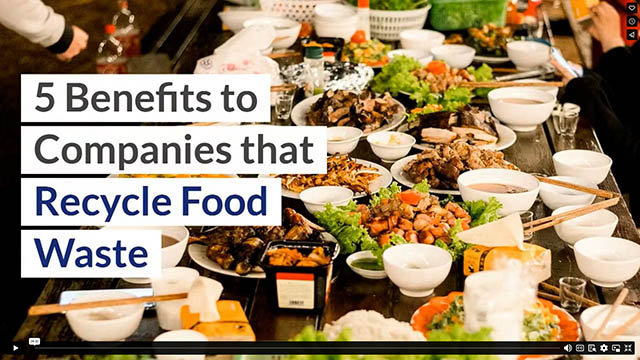
5 Benefits to Companies that Recycle Food Waste
The reasons why food ends up in the garbage vary greatly depending on the setting. Most industries consider peels, cores, husks, and skins along with foods we eat as food waste since they can be composted or recycled the same way the edible parts of food are.
Food waste isn’t a new problem. Since the industrial revolution, growers, supply chains, grocers, and consumers have all become accustomed to throwing away food. People throw food away for a variety of reasons, including the following:
- Too Much – Whether you served yourself too much or over-catered for an event, once food is served it’s often either eaten or thrown out.
- Rotten – Fresh foods spoil in the fields, in transit to the supermarket, on grocery store shelves, and in consumer homes.
- Aesthetics – Many food producers scan their products and throw out the oddly shaped and colored ones to maintain a minimum quality.
Of all the food produced, approximately ⅓ ends up being wasted. That’s inexcusable when considering it is more than enough to feed all of the malnourished people in the world with half left over. Companies that make an extra effort to recycle food waste can get ahead of the game, as people become more and more concerned with the state of the environment.
Recycling Food Waste
Since the quality and nutritional value of discarded food varies greatly, there are three main options for recycling this kind of waste.
- Give it to Charity – This is the best option if you have leftover non-perishable items.
- Feed it to Animals – Food scraps make the perfect feed for pigs, chickens, and other livestock.
- Compost – Classic composting creates fantastic soil while anaerobic digestive plants create biofuel and fertilizer.
Generally, the missing link in the chain of recycling food waste comes from getting the food from consumers and producers to charities, farmers, and composters. If you create food waste in your workplace (and almost all companies do), you can take the initiative to provide collection bins for food waste. The great thing about recycling food waste is that it offers numerous benefits to your company and requires little time or monetary investment.
1. Financial Benefits
Wasted food is wasted money. Collecting food waste allows you to turn otherwise expensive garbage into something profitable. Biofuel companies and farms will save you money by reducing your frequent need to empty dumpsters into landfills. If employees know that the company is concerned about food waste, they will also be more careful not to throw as much away.
2. Community Benefits
Food charity donations are essential to most communities and help those who don’t have enough in the local area. Recycling non-perishable food waste won’t cost you anything but will benefit others hugely.
Providing compost or fertilizer for local gardeners and plant nurseries is another excellent way to serve the community using your food waste. All good composting requires is the right setup and time. Often, volunteers are more than happy to help your company get involved with composting initiatives.
3. Carbon Emission Benefits
Reducing your company’s carbon footprint is important to employers, investors, and consumers. Since a company generally includes many people working together, reducing the impact your business has on the environment makes a greater difference than any individual can have alone.
When left in a landfill, food waste releases methane gas. Methane is one of the most potent greenhouse gasses accelerating climate change. Recycling food waste eliminates rotting food, releasing methane into the atmosphere. When transformed into fertilizer and soil, it can actually help reduce carbon in the atmosphere.
4. Brand Benefits
After considering the community and carbon footprint benefits, the subsequent benefits to your company’s brand aren’t hard to imagine. Although you don’t want to greenwash your companies efforts, reducing food waste does allow you to:
- Advertise a genuine initiative to reduce your impact on the environment
- Gain trust with influential community members also involved in food charities
- Provide a work culture where environmentally-conscious employees feel heard
- Stand out among brands for your environmental focus
5. Legal Red Tape Benefits
Legal compliance can be a headache. Enforced waste management practices are becoming more and more popular in California and the midwest. Recycling food waste helps meet legal requirements and avoid unnecessary hassle with legal red tape. Even if laws aren’t in place yet, it pays to be ahead of the game.
Implementing Food Waste Recycling
So now that you know some of the benefits of recycling food waste, how do you get the ball rolling? Here at Atlas Disposal, we can provide whatever size of containers you want with scheduled waste pick-up times that suit your Salt Lake City company best. We believe a business is only as sustainable as its environment. Recycling food waste creates a more sustainable environment where your business can thrive.

